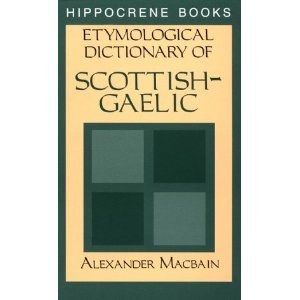Издатель: Hippocrene Books
Год издания: 1998
Количество страниц: 277
ISBN-10: 0781806321
ISBN-13: 978-0781806329
Язык: English
Although this dictionary was compiled in 1896, it served well as the research tool I hoped it would. I needed some words of ancient Celtic for an in-progress novel, but Macbain also gave others in Gaulish and Gothic that were useful. A total of 45 language derivations is given, not for the same word, of course, but where applicable. For example, one entry that included a well-known Gallic name, "Cingetorix," gave its derivation and literal translation, as well as Irish, Old Irish, Welsh, Coish, Breton, Indo-European, German and Sanskrit variations on the root word. Macbain starts with an outline of Gaelic etymology, discussing its Celtic roots in an overview of Aryan or Indo-European languages, and the pronunciation of Gaelic and Celtic alphabets, accents and word-building. A synopsis of Gaelic, Old Irish and Gadelic noun declensions and verb conjugations is included. Macbain quotes sources from 740 CE to his late 19th century contemporaries. A drawback is that there is no English to Scottish-Gaelic section, but that at least forces you to scan the origin of each word entry. Albert Noyer, author, The Saint's Day Deaths.
This dictionary does contain interesting words which likely have cultural links to Scotland, for example instead of having the word "cow" they might have fifteen different words of variation, with meanings like "newbo cow with spots" and other very specific forms. While these translations were interesting from a cultural perspective, this book simply did not deliver when I was looking for a word that I would use in real conversation. Unfortunately this book is simply too outdated for use as a primary leaer's dictionary.
Год издания: 1998
Количество страниц: 277
ISBN-10: 0781806321
ISBN-13: 978-0781806329
Язык: English
Although this dictionary was compiled in 1896, it served well as the research tool I hoped it would. I needed some words of ancient Celtic for an in-progress novel, but Macbain also gave others in Gaulish and Gothic that were useful. A total of 45 language derivations is given, not for the same word, of course, but where applicable. For example, one entry that included a well-known Gallic name, "Cingetorix," gave its derivation and literal translation, as well as Irish, Old Irish, Welsh, Coish, Breton, Indo-European, German and Sanskrit variations on the root word. Macbain starts with an outline of Gaelic etymology, discussing its Celtic roots in an overview of Aryan or Indo-European languages, and the pronunciation of Gaelic and Celtic alphabets, accents and word-building. A synopsis of Gaelic, Old Irish and Gadelic noun declensions and verb conjugations is included. Macbain quotes sources from 740 CE to his late 19th century contemporaries. A drawback is that there is no English to Scottish-Gaelic section, but that at least forces you to scan the origin of each word entry. Albert Noyer, author, The Saint's Day Deaths.
This dictionary does contain interesting words which likely have cultural links to Scotland, for example instead of having the word "cow" they might have fifteen different words of variation, with meanings like "newbo cow with spots" and other very specific forms. While these translations were interesting from a cultural perspective, this book simply did not deliver when I was looking for a word that I would use in real conversation. Unfortunately this book is simply too outdated for use as a primary leaer's dictionary.

